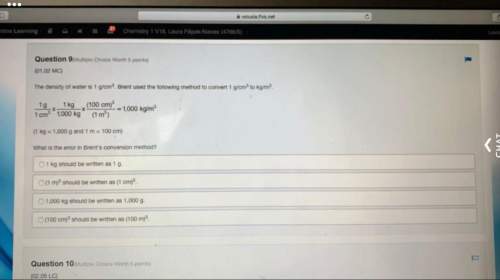
Chemistry, 10.02.2021 21:40 krisbarnett5353
Liquid Mercury has a density of 13.55 g/cm3 at room temperature (20.0 ° C).
You are trying to design a container to hold a 3.40 X 104 mg sample of mercury.
This mercury expands at 1.11 μl (microliter) per degree it is heated.
What is the minimum volume ( in liters) of the container if you want the sample to be able to be heated to 200.0 ° C? (Assume that the sample starts at room temperature.)
If this was in a sealed tube with a diameter of 0.550 cm, how tall(in cm) would the tube need to be to hold the mercury through these temperature changes? [ V= π r2h (cylinder) ] Please show your work!

Answers: 3


Another question on Chemistry

Chemistry, 22.06.2019 06:30
What effect might melting sea ice have for people who live in coastal areas?
Answers: 1

Chemistry, 22.06.2019 14:00
8.98 dm3 of hydrogen gas is collected at 38.8 °c. find the volume the gas will occupy at -39.9 °c if the pressure remains constant.
Answers: 3

Chemistry, 22.06.2019 21:30
If 22.5 of nitrogen at 748 mm hg are compressed to 725 mm hg at constant temperature. what is the new volume?
Answers: 1

Chemistry, 23.06.2019 02:30
Which of the four hypothetical substances you investigated would be most harmful to living organisms? 50 points!
Answers: 2
You know the right answer?
Liquid Mercury has a density of 13.55 g/cm3 at room temperature (20.0 ° C).
You are trying to desig...
Questions

Computers and Technology, 19.02.2021 18:40

Mathematics, 19.02.2021 18:40



Chemistry, 19.02.2021 18:40

Mathematics, 19.02.2021 18:40

Mathematics, 19.02.2021 18:40

Social Studies, 19.02.2021 18:40

Geography, 19.02.2021 18:40


Mathematics, 19.02.2021 18:40

Mathematics, 19.02.2021 18:40

History, 19.02.2021 18:40

Mathematics, 19.02.2021 18:40

Mathematics, 19.02.2021 18:40



Mathematics, 19.02.2021 18:40





